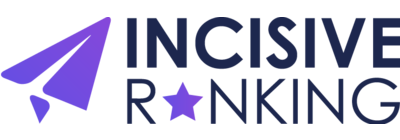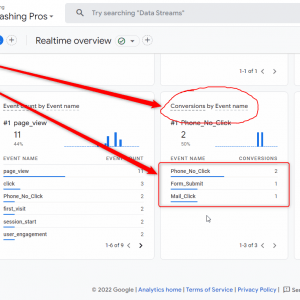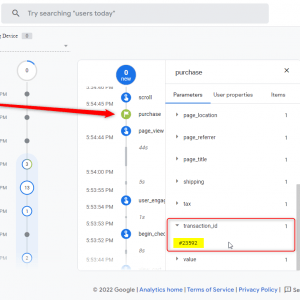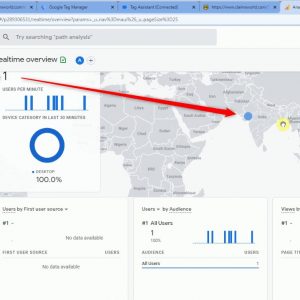No products in the cart.

Table of Contents
- 1 Introduction to GA4
- 1.1 1. Understanding the Key Features of Google Analytics 4
- 1.1.1 1.1 Data-driven Attribution: How GA4’s approach to attribution modeling enhances marketing effectiveness.
- 1.1.2 1.2 User-level Data: Uncovering valuable audience insights through individual user analysis in GA4.
- 1.1.3 1.3 Predictive Insights: Anticipating future trends and behaviors with machine learning in GA4.
- 1.1.4 1.4 Metadata: Making data exploration easier with customized dimensions and parameters in GA4.
- 1.2 2. The Privacy-Centric Approach of Google Analytics 4
- 1.2.1 2.1 Privacy Controls: Empowering Users with Data Protection Mechanisms in GA4
- 1.2.2 2.2 Engagement Measurement: Capturing Holistic User Interactions across Channels in GA4’s Model
- 1.2.3 2.3 Customer-centric Measurement: Understanding the Complete User Journey through Lifecycle Reporting in GA4
- 1.2.4 2.4 No IP Storage: Safeguarding User Anonymity with IP Address Anonymization in GA4
- 1.3 3. Leveraging Google Analytics 4 for Comprehensive Campaign Optimization and ROI Improvement
- 1.4 4. Ensuring Accurate Data Tracking and User Privacy in Google Analytics 4 Implementation
- 1.5 5. Upgrading from Universal Analytics to the Future of Google Analytics 4
- 1.6 6. Connecting Google Ads with Enhanced Insights from Google Analytics 4
- 1.7 7. Explore Advanced Analytics Techniques with Google Analytics 4
- 1.8 Conclusion
- 1.9 My Portfolio:
- 1.10 Let’s Audit First, Why is it Required?
- 1.11 I am also available here!
- 1.1 1. Understanding the Key Features of Google Analytics 4
Introduction to GA4
Google Analytics 4 (GA4) is the next generation of Analytics that revolutionizes the way we measure and analyze data from websites and apps. Unlike its predecessor, Universal Analytics, GA4 collects event-based data, providing a more comprehensive understanding of user interactions and behaviours.
In today’s evolving digital landscape, where users engage with brands across multiple channels and devices, GA4 plays a vital role in helping businesses gain accurate measurement and valuable insights. By adopting GA4, organizations can unlock the full potential of their data to drive informed decision-making and optimize their digital strategies.
The significance of GA4 lies in its ability to adapt to the changing ecosystem and meet the growing demands of marketers and analysts. It offers advanced features and functionalities that empower businesses to make data-driven decisions and stay ahead in a competitive market.
Key talking points for this section include:
- A brief explanation of Google Analytics 4 as the next generation of Analytics
- The significance of adopting GA4 for accurate measurement and insights in websites and apps
With GA4, businesses can harness the power of event-based data collection to gain a deeper understanding of user behaviour, enhance marketing effectiveness, and drive ROI. In the following sections, we will explore the key features of GA4, its privacy-centric approach, campaign optimization strategies, implementation best practices, migration from Universal Analytics, integration with Google Ads, advanced analytics techniques, and more.
Join us on this ultimate guide to Google Analytics 4 as we dive into its capabilities and discover how it can empower your business in the ever-evolving digital landscape.
Is your GA4 Conversion Tracking correctly implemented?
1. Understanding the Key Features of Google Analytics 4
Google Analytics 4 (GA4) comes packed with a range of powerful features that enable advanced analytics and provide valuable insights for websites and apps. Let’s dive into each key feature of GA4 and explore how they contribute to enhanced measurement and analysis.
1.1 Data-driven Attribution: How GA4’s approach to attribution modeling enhances marketing effectiveness.
GA4 introduces a data-driven attribution model that helps marketers understand the true impact of their marketing efforts. Unlike traditional models that rely on rules-based attribution, GA4 uses machine learning algorithms to analyze user behaviour patterns and attribute credit to different touchpoints along the customer journey. By accurately assigning credit, marketers can make better-informed decisions about budget allocation and optimize their campaigns for maximum effectiveness.
1.2 User-level Data: Uncovering valuable audience insights through individual user analysis in GA4.
One of the standout features of GA4 is its ability to provide granular insights at the individual user level. With GA4, you can track and analyze user interactions across multiple sessions, devices, and platforms. This deeper understanding of user behaviour allows you to tailor your marketing strategies to specific segments and create highly personalized experiences for your audience. By leveraging user-level data, you can uncover valuable insights that drive meaningful engagement and conversions.
1.3 Predictive Insights: Anticipating future trends and behaviors with machine learning in GA4.
GA4 leverages the power of machine learning to provide predictive insights into future trends and behaviours. By analyzing historical data, GA4 can identify patterns and make predictions about user actions, such as the likelihood to convert or churn. These predictive insights empower marketers to proactively optimize their campaigns, personalize messaging, and deliver relevant content at the right time. With GA4’s predictive capabilities, you can stay one step ahead of your audience and drive better business outcomes.
1.4 Metadata: Making data exploration easier with customized dimensions and parameters in GA4.
GA4 offers enhanced metadata capabilities that make data exploration and analysis more efficient. With customizable dimensions and parameters, you can organize and categorize your data in a way that aligns with your unique business needs. This flexibility allows you to dive deep into specific segments or metrics, gain a comprehensive understanding of user behaviour, and extract actionable insights. GA4’s metadata features empower you to unlock the full potential of your data and make more informed decisions.
In summary, the key features of Google Analytics 4 – data-driven attribution, user-level data analysis, predictive insights, and customizable metadata – provide marketers with a robust toolkit for advanced analytics. By leveraging these features, you can gain deeper insights into user behaviour, optimize marketing campaigns, and drive better business outcomes. These features provide immense benefits to GA4 users.
2. The Privacy-Centric Approach of Google Analytics 4
Privacy is crucial in analytics today, and Google Analytics 4 (GA4) understands this importance. GA4 takes a privacy-centric approach by implementing various features and controls to protect user data while providing valuable insights. In this section, we will explore how GA4 addresses privacy concerns and empowers users with data protection mechanisms.
2.1 Privacy Controls: Empowering Users with Data Protection Mechanisms in GA4
GA4 offers robust privacy controls that allow users to manage their data and choose how it is collected and used. These controls include:
- Data Deletion: Users can request the deletion of their personal data from GA4, ensuring compliance with data protection regulations such as GDPR.
- Consent Settings: GA4 provides options to implement consent management frameworks, allowing users to give or withdraw consent for data collection.
- User-level Opt-out: GA4 enables users to opt out of tracking by using browser settings or implementing opt-out mechanisms.
By giving users control over their data, GA4 ensures transparency and builds trust between businesses and their audiences.
2.2 Engagement Measurement: Capturing Holistic User Interactions across Channels in GA4’s Model
GA4 embraces a more comprehensive approach to measuring user engagement across channels, including websites and apps. It allows businesses to capture valuable insights into user behaviour by understanding how users interact with various touchpoints throughout their journey.
With GA4’s event-based data collection model, businesses can track specific actions taken by users, such as app installations, video views, or purchases. This granular level of engagement measurement enables businesses to gain a deeper understanding of user preferences and optimize their strategies accordingly.
2.3 Customer-centric Measurement: Understanding the Complete User Journey through Lifecycle Reporting in GA4
Understanding the complete user journey is essential for businesses to make informed decisions and drive meaningful outcomes. GA4’s customer-centric measurement provides lifecycle reporting, allowing businesses to track user interactions from acquisition to conversion and retention.
By analyzing the entire user journey, businesses can identify areas of improvement, optimize their marketing efforts, and deliver personalized experiences. GA4’s customer-centric measurement empowers businesses to focus on building strong relationships with their audience and nurturing long-term loyalty.
2.4 No IP Storage: Safeguarding User Anonymity with IP Address Anonymization in GA4
GA4 takes privacy seriously by anonymizing IP addresses, ensuring that individual users cannot be identified. This approach protects user anonymity while still providing valuable insights into user behaviour and preferences.
By not storing IP addresses, GA4 aligns with privacy regulations and upholds the highest standards of data protection. This commitment to privacy further establishes GA4 as a privacy-centric analytics solution.
3. Leveraging Google Analytics 4 for Comprehensive Campaign Optimization and ROI Improvement
When it comes to optimizing your marketing campaigns and improving your return on investment (ROI), Google Analytics 4 (GA4) offers a range of advanced features and capabilities. Let’s explore how you can leverage GA4 for comprehensive campaign optimization strategies.
3.1 Understanding Marketing Impact with Attribution Credit in GA4
Attribution modeling is crucial for understanding the impact of your marketing efforts across different channels and touchpoints. GA4 provides advanced attribution models that go beyond last-click attribution, allowing you to allocate credit to various touchpoints in the customer journey.
By analyzing attribution credit in GA4, you can gain insights into which marketing channels and campaigns are driving conversions and revenue. This information enables you to make data-driven decisions when allocating resources and optimizing your marketing budget.
3.2 From Insights to Action: Using GA4 to Optimize Campaign Performance in Real-Time
One of the strengths of GA4 is its ability to provide real-time insights into campaign performance. With GA4, you can monitor key metrics such as website traffic, engagement, and conversion rates in real-time. This allows you to identify underperforming campaigns or channels quickly and take immediate action to optimize them.
For example, if you notice that a particular ad campaign is driving high-quality traffic but not converting well, you can make adjustments to the campaign settings or landing page in real-time. By continuously monitoring and optimizing your campaigns with GA4, you can maximize their performance and achieve better ROI.
3.3 Driving ROI with Advanced Attribution Modeling and Predictive Analysis in GA4
GA4 takes campaign optimization a step further with its advanced attribution modeling capabilities. By leveraging machine learning algorithms, GA4 can predict the future impact of your marketing efforts based on historical data.
With predictive analysis in GA4, you can identify trends, patterns, and potential opportunities for campaign optimization. For example, GA4 can help you determine the optimal timing and frequency of your marketing campaigns based on historical data and user behaviour.
By leveraging advanced attribution modeling and predictive analysis in GA4, you can make data-driven decisions that drive higher ROI. You can allocate your resources effectively, optimize your campaigns based on predicted outcomes, and continuously refine your marketing strategies for maximum impact.
In conclusion, GA4 provides a powerful platform for comprehensive campaign optimization and ROI improvement. By understanding the marketing impact with attribution credit, optimizing campaign performance in real time, and leveraging advanced attribution modeling and predictive analysis, you can make data-driven decisions that drive better results. With GA4’s advanced features, you can take your marketing efforts to the next level and achieve greater success in today’s competitive digital landscape.
Are you facing an issue while setting up GA4 Conversion Tracking?
4. Ensuring Accurate Data Tracking and User Privacy in Google Analytics 4 Implementation
Google Analytics 4 (GA4) offers advanced features for accurate data tracking and user privacy management. Implementing GA4 tracking code involves best practices to ensure data accuracy, user privacy, and efficient configuration.
Best Practices for Implementing GA4 Tracking Code
- Custom Dimensions: Utilize custom dimensions to capture specific data points relevant to your business objectives. Custom dimensions enable tailored data collection, providing deeper insights into user behaviour and interactions.
- Adherence to SLAs: Adhere to Service Level Agreements (SLAs) for accurate and timely data processing. Compliance with SLAs ensures that data is processed and reported within the specified timeframes, maintaining the integrity of analytics insights in GA4.
Managing User-level Data with Custom Events and Parameters in GA4
- Custom Events: Implement custom events to track specific user interactions that align with your measurement goals. Custom events allow you to capture detailed user actions, such as video views, file downloads, or form submissions, enhancing the granularity of your analytics data.
- Custom Parameters: Leverage custom parameters to enrich event data with additional context or attributes. Custom parameters provide flexibility in tailoring event details, enabling a more comprehensive analysis of user activities.
Enforcing Data Governance through Consent Settings and Data Deletion in GA4
- Consent Settings: Implement robust consent settings to respect user preferences regarding data collection and processing. Adhering to privacy regulations and user consent choices is essential for maintaining trust and compliance with data protection laws.
- Data Deletion: Establish protocols for managing data deletion requests from users. GA4 provides mechanisms for honouring user requests related to data deletion, ensuring adherence to privacy principles and regulations.
Maintaining Data Accuracy and Consistency with Streamlined Configuration in GA4
- Streamlined Configuration: Configure GA4 properties to maintain data accuracy and consistency across various touchpoints. Streamlined configuration involves aligning data collection methodologies with business requirements while ensuring uniformity in reporting metrics.
By following these best practices, businesses can harness the full potential of Google Analytics 4 while upholding data accuracy, privacy controls, and governance standards. This approach lays a solid foundation for deriving actionable insights and maximizing the value of analytics in the evolving digital landscape.
5. Upgrading from Universal Analytics to the Future of Google Analytics 4
As you switch from Universal Analytics to Google Analytics 4 (GA4), you unlock new features and a stronger analytics platform. Let’s explore the benefits of this transition and learn about the migration process:
Advantages of Moving to GA4
Here’s why migrating to GA4 can be beneficial for your business:
- Tracking Users Across Websites and Apps: GA4 offers a unified way to track user interactions across different platforms, giving you a complete picture of user engagement.
- Advanced Reporting Capabilities: With GA4, you get access to advanced reporting tools that provide deeper insights into how users behave and interact with your digital assets.
Steps to Migrate from Universal Analytics to GA4
To successfully move from Universal Analytics to GA4, follow these steps:
- Evaluate Your Data: Start by identifying the data that needs to be transferred from your Universal Analytics properties to GA4. This includes important metrics, dimensions, and custom event data that are crucial for your reporting needs.
- Set Up a New Property: Create a new GA4 property alongside your existing Universal Analytics property. This allows you to track data in both systems simultaneously and ensures a smooth transition without disrupting your current analytics setup.
- Adjust Tracking Tags: Update your website and app tracking tags to accommodate the new GA4 measurement model. This might involve modifying existing tags or adding new ones specifically for GA4 tracking purposes.
- Test Your Setup: Before fully committing to GA4, thoroughly test the new setup to confirm that data is being accurately collected and reported. This step is important to avoid any loss of critical analytics information during the transition.
- Complete the Migration: Once everything is validated, finalize the migration by directing your tracking tags and traffic towards the new GA4 property. Keep an eye on the data flow and ensure that all essential metrics are being captured correctly in GA4.
By embracing this migration, you’re preparing your analytics infrastructure for future advancements and gaining deeper insights into user behaviour across multiple channels.
Remember, a successful migration requires careful planning and execution to maintain data accuracy while taking advantage of the enhanced capabilities of Google Analytics 4.
6. Connecting Google Ads with Enhanced Insights from Google Analytics 4
Google Analytics 4 (GA4) presents a powerful opportunity for marketers to enhance their campaign performance by integrating with Google Ads, the leading online advertising platform. By leveraging the combined capabilities of GA4 and Google Ads, marketers can gain deeper insights into user behaviour, optimize campaign strategies, and maximize the impact of their advertising efforts.
Exploring the Synergy between GA4 and Google Ads
The integration of GA4 with Google Ads unlocks a synergy that allows marketers to seamlessly connect their analytics and advertising efforts. By bridging the gap between user insights and ad performance, this integration empowers marketers to make data-driven decisions that drive better results.
Unlocking Full-Funnel Insights with GA4 and Google Ads Integration
One of the key advantages of integrating GA4 with Google Ads is the ability to gain full-funnel insights into user interactions. This means that marketers can track user behaviour from initial touchpoints to conversion, enabling a comprehensive understanding of the entire customer journey. By analyzing user interactions across different stages of the funnel, marketers can optimize their ad targeting and messaging to effectively guide users through the conversion process.
Going Beyond Last Click: Attribution Expansion Opportunities with GA4 Data in Google Ads
Traditional attribution models often rely on last-click attribution, which may not provide a complete picture of the customer journey. However, by incorporating GA4 data into Google Ads, marketers can expand their attribution modeling beyond the last click. This allows for a more nuanced understanding of how different touchpoints contribute to conversions, enabling more accurate and insightful attribution modeling.
By harnessing the power of GA4’s advanced analytics and machine learning capabilities in conjunction with Google Ads, marketers can unlock new opportunities for enhancing campaign performance and driving meaningful results.
Want to setup GA4 Conversion Tracking on your website?
7. Explore Advanced Analytics Techniques with Google Analytics 4
Google Analytics 4 (GA4) offers powerful features that can help you analyze your website’s performance and gain valuable insights. Here are some advanced analytics techniques you can explore with GA4:
1. Applying Machine Learning for Predictive Insights
GA4 utilizes machine learning algorithms to analyze your data and predict future trends. By understanding these predictions, you can make informed decisions and optimize your marketing strategies. For example, GA4 can help you identify which user segments are more likely to convert, allowing you to target them with personalized campaigns.
2. Customizing Reports with BigQuery Export
If you have complex reporting requirements, GA4 allows you to export your data to BigQuery, a powerful data warehouse solution. With BigQuery, you can perform advanced analysis, create custom reports, and combine data from multiple sources. This integration enables you to tailor your reports according to your specific needs and get a comprehensive view of your business performance.
By leveraging these advanced analytics techniques in GA4, you can gain deeper insights into your website’s performance and make data-driven decisions that drive growth.
Are you ready to take your analytics game to the next level? Let’s dive into these techniques in more detail!
Conclusion
As the digital landscape continues to evolve, businesses need to adopt the next generation of analytics tools. Google Analytics 4 (GA4) is the future of analytics, offering advanced features and a privacy-centric approach that empowers businesses to gain accurate measurements and valuable insights.
By upgrading to GA4, you can unlock a range of benefits and capabilities that will drive your business forward. Here are some key reasons why you should embrace GA4:
- Enhanced Analytics: GA4 introduces key features such as data-driven attribution, user-level data analysis, predictive insights, and metadata customization. These features provide a deeper understanding of your audience, allowing you to make data-driven decisions.
- Privacy Protection: With increasing concerns about user privacy, GA4 prioritizes data protection. It offers privacy controls, engagement measurement across channels, customer-centric reporting, and IP address anonymization. This ensures that you can respect user privacy while still gaining valuable insights.
- Comprehensive Campaign Optimization: GA4 enables end-to-end campaign optimization strategies by providing advanced attribution modeling, real-time performance optimization, and predictive analysis. This helps you optimize your marketing efforts and drive better ROI.
- Accurate Data Tracking: Implementing GA4 with best practices ensures accurate data tracking and user privacy. Custom events and parameters allow for better management of user-level data, while consent settings and data deletion ensure compliance with regulations.
- Integration with Google Ads: By connecting GA4 with Google Ads, you can unlock enhanced insights and improve campaign performance. Full-funnel insights, attribution expansion opportunities beyond last-click, and combined web-app data optimization are just some of the benefits you can enjoy.
Embrace the future of analytics by upgrading to Google Analytics 4 today. For further learning or implementation support, check out the resources provided by Google’s official documentation and community forums.
Let’s Audit First, Why is it Required?
Tracking errors can greatly affect your Data, Conversion Reporting, strategic Decision-Making and that Cost you in Revenue.
First, I audit your website’s current Tag & Tracking configuration. Then I will share errors/recommendations with their solutions as the best practices the industry follows. I can also help you to implement it the right way.







